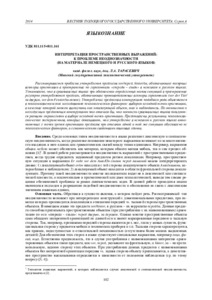Please use this identifier to cite or link to this item:
https://elib.psu.by/handle/123456789/11252Full metadata record
| DC Field | Value | Language |
|---|---|---|
| dc.contributor.author | Тарасевич, Л. А. | - |
| dc.date.accessioned | 2015-03-28T12:31:36Z | - |
| dc.date.available | 2015-03-28T12:31:36Z | - |
| dc.date.issued | 2014 | - |
| dc.identifier.citation | Вестник Полоцкого государственного университета. Серия A, Гуманитарные науки : научно-теоретический журнал. - 2014. - № 10. – C. 102-107. | ru_RU |
| dc.identifier.issn | 2070-1608 | - |
| dc.identifier.uri | https://elib.psu.by/handle/123456789/11252 | - |
| dc.description | Prepositional Constructions of Spatial Orientation in English and German: Ambiguity of Interpretation. L. Tarasevitsh | ru_RU |
| dc.description.abstract | Рассматривается проблема употребления предлогов vor/перед, hinter/за, обозначающих полярные векторы ориентации в пространстве по горизонтали «спереди – сзади» в немецком и русском языках. = The article discusses the problem of the usage of the prepositions vor/перед, hinter/за that define the opposite vectors of spatial orientation in the horizontal direction “in front of – behind” in the German and Russian languages. As was found out, in the two compared languages, while defining certain types of space situations, the prepositions that name opposite horizontal vectors are regularly used (vor der Tür/за дверью, vor dem Fenster/за окном). In psycholinguistic studies, the use of the prepositions in constructions of such types is explained by a psychological factor: by the choice of the perspective which the localizing object as well as the viewer can be. In relation to the researched prepositional constructions it would mean that the studied languages native speakers make use of different strategies in their choice of the perspective. The article features the results of the psycholinguistic experiments that prove the following: the use of the opposite in terms of the orientation prepositions in descriptions of one and the same situation is determined not by the above mentioned psychological factor but by the semantic features of the discussed language items. | ru_RU |
| dc.language.iso | ru | ru_RU |
| dc.publisher | Полоцкий государственный университет | ru_RU |
| dc.relation.ispartof | Вестник Полоцкого государственного университета. Серия A, Гуманитарные науки | ru_RU |
| dc.relation.ispartof | Веснік Полацкага дзяржаўнага ўніверсітэта. Серыя А, Гуманітарныя навук | be_BE |
| dc.relation.ispartof | Herald of Polotsk State University Series A, Humanity sciences | en_EN |
| dc.relation.ispartofseries | Серия A, Гуманитарные науки;2014. - № 10 | - |
| dc.rights | open access | ru_RU |
| dc.subject | Государственный рубрикатор НТИ - ВИНИТИ::ОБЩЕСТВЕННЫЕ НАУКИ::Языкознание | ru_RU |
| dc.subject | Немецкий язык | ru_RU |
| dc.subject | Русский язык | ru_RU |
| dc.subject | Грамматика | ru_RU |
| dc.title | Интерпретация пространственных выражений: к проблеме неоднозначности (на материале немецкого и русского языков) | ru_RU |
| dc.type | Article | ru_RU |
| Appears in Collections: | 2014, № 10 | |
Files in This Item:
| File | Description | Size | Format | |
|---|---|---|---|---|
| 102-107.pdf | 173.9 kB | Adobe PDF |  View/Open |
Items in DSpace are protected by copyright, with all rights reserved, unless otherwise indicated.